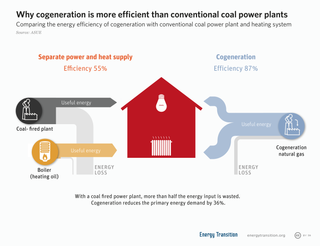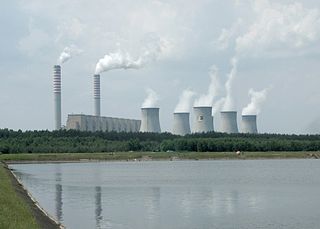Energy in Cameroon is a growing industry with tremendous potential, especially with the hydroelectric industry. With a total installed capacity of 1,292 MW, the mix of energy production of Cameroon consists of 57% of hydraulic power source, 21% of thermal springs in the gas, 10% of heat source to light fuel oil and 13% of heat source to heavy fuel oil. [1]
The oil sector is managed by the national oil company Société Nationale des Hydrocarbures .
In cooperation with GDF Suez, Société Nationale des Hydrocarbures is planning to build a liquefied natural gas plant. [2]

Electricity generation is the process of generating electric power from sources of primary energy. For utilities in the electric power industry, it is the stage prior to its delivery to end users or its storage.

A fossil fuel is a fuel formed by natural processes, such as anaerobic decomposition of buried dead organisms, containing organic molecules originating in ancient photosynthesis that release energy in combustion. Such organisms and their resulting fossil fuels typically have an age of millions of years, and sometimes more than 650 million years.
An energy crisis is any significant bottleneck in the supply of energy resources to an economy. In literature, it often refers to one of the energy sources used at a certain time and place, in particular, those that supply national electricity grids or those used as fuel in industrial development and population growth have led to a surge in the global demand for energy in recent years. In the 2000s p, this new demand — together with Middle East tension, the falling value of the US dollar, dwindling oil reserves, concerns over peak oil, and oil price speculation — triggered the 2000s energy crisis, which saw the price of oil reach an all-time high of $147.30 a barrel in 2008

Elf Aquitaine is a French brand of oils and other motor products for automobiles and trucks. Elf is a former petroleum company which merged with TotalFina to form "TotalFinaElf". The new company changed its name to Total in 2003 and currently TotalEnergies in 2021. Elf has been maintained as a major brand of TotalEnergies since then.

Energy development is the field of activities focused on obtaining sources of energy from natural resources. These activities include production of conventional, alternative and renewable sources of energy, and for the recovery and reuse of energy that would otherwise be wasted. Energy conservation and efficiency measures reduce the demand for energy development, and can have benefits to society with improvements to environmental issues.

Alternative fuel, known as non-conventional and advanced fuels, are any materials or substances that can be used as fuels, other than conventional fuels like; fossil fuels, as well as nuclear materials such as uranium and thorium, as well as artificial radioisotope fuels that are made in nuclear reactors.

Cogeneration or combined heat and power (CHP) is the use of a heat engine or power station to generate electricity and useful heat at the same time.
The hydrogen economy is a term used to cover using hydrogen as the main fuel for heat, vehicles, energy storage and the long distance transport of energy. In order to phase out fossil fuels and limit climate change, hydrogen can be created from water using renewable sources such as wind and solar, and its combustion only releases water vapor to the atmosphere.
In energy economics and ecological energetics, energy return on investment (EROI), also sometimes called energy returned on energy invested (ERoEI), is the ratio of the amount of usable energy delivered from a particular energy resource to the amount of exergy used to obtain that energy resource.

A fossil fuel power station is a thermal power station which burns a fossil fuel, such as coal or natural gas, to produce electricity. Fossil fuel power stations have machinery to convert the heat energy of combustion into mechanical energy, which then operates an electrical generator. The prime mover may be a steam turbine, a gas turbine or, in small plants, a reciprocating gas engine. All plants use the energy extracted from expanding gas, either steam or combustion gases. Although different energy conversion methods exist, all thermal power station conversion methods have efficiency limited by the Carnot efficiency and therefore produce waste heat.

The energy industry is the totality of all of the industries involved in the production and sale of energy, including fuel extraction, manufacturing, refining and distribution. Modern society consumes large amounts of fuel, and the energy industry is a crucial part of the infrastructure and maintenance of society in almost all countries.

Denmark has considerable sources of oil and natural gas in the North Sea and ranked as number 32 in the world among net exporters of crude oil in 2008. Denmark expects to be self-sufficient with oil until 2050. However, gas resources are expected to decline, and production may decline below consumption in 2020, making imports necessary. Denmark imports around 12% of its energy.

Energy security is the association between national security and the availability of natural resources for energy consumption. Access to (relatively) cheap energy has become essential to the functioning of modern economies. However, the uneven distribution of energy supplies among countries has led to significant vulnerabilities. International energy relations have contributed to the globalization of the world leading to energy security and energy vulnerability at the same time.

Shale oil extraction is an industrial process for unconventional oil production. This process converts kerogen in oil shale into shale oil by pyrolysis, hydrogenation, or thermal dissolution. The resultant shale oil is used as fuel oil or upgraded to meet refinery feedstock specifications by adding hydrogen and removing sulfur and nitrogen impurities.

Renewable energy in Finland grew to 38.7% of total final energy consumption by year end 2014, achieving joint second position with Latvia in terms of renewable energy consumption by share amongst the EU-28 countries, behind its neighbour Sweden in first position on a 52.6% share. The 2014 share in Finland breaks down as renewable energy providing 52% of the heating and cooling sector, 31.4% of the electricity sector and 21.6% of the transport sector. By 2014, Finland had already exceeded its 2020 target for renewable energy use under the EU renewable energy directive as shown in the table of country targets.

Energy in Finland describes energy and electricity production, consumption and import in Finland. Energy policy of Finland describes the politics of Finland related to energy. Electricity sector in Finland is the main article of electricity in Finland.

A fuel is any material that can be made to react with other substances so that it releases energy as thermal energy or to be used for work. The concept was originally applied solely to those materials capable of releasing chemical energy but has since also been applied to other sources of heat energy such as nuclear energy.
Benin is a coastal country located in the Gulf of Guinea in Western Africa, which is a resource rich region. Energy in Benin has a diverse energy mix and takes several forms including: solar, wind, hydropower, biomass, fossil resources, and mineral resources. Out of this energy mix, about 60% of energy comes from biomass. Benin is also dependent on energy imports from Ghana and Côte d'Ivoire. While power plants and other energy facilities were built in the 1950s and 1960s, the lack of investment has led to deterioration over time. Similarly, its location in the oil-rich Gulf of Guinea has led to an attempt of oil production starting in the late 1980s. However, due to unprofitable operations, oil production halted in 1998.
Société Nationale des Hydrocarbures (SNH) is a national oil and gas company of Cameroon. The company was established on 12 March 1980. SNH operates in partnership with international oil companies and it is responsible for selling the government's share of oil output. It holds a minor stake in projects operated by international partners.

World energy supply and consumption is global production and preparation of fuel, generation of electricity, energy transport and energy consumption. It is a basic part of economic activity. It does not include energy from food.